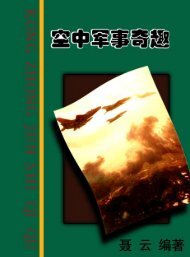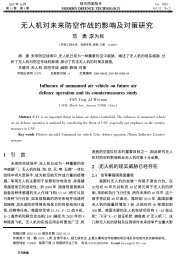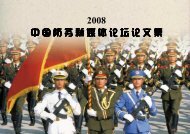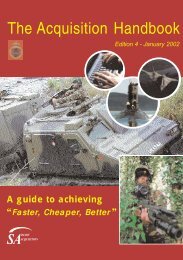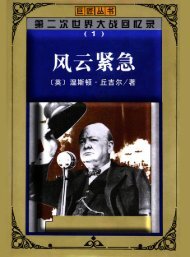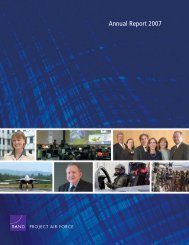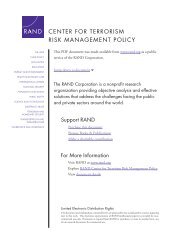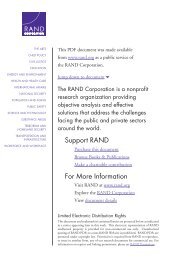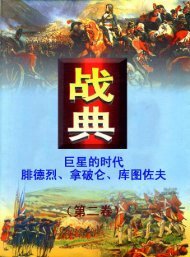How Terrorist Groups End - RAND Corporation
How Terrorist Groups End - RAND Corporation
How Terrorist Groups End - RAND Corporation
You also want an ePaper? Increase the reach of your titles
YUMPU automatically turns print PDFs into web optimized ePapers that Google loves.
Policing and Japan’s Aum Shinrikyo 59<br />
to the Tokyo subway attack with a massive intelligence-collection and<br />
-analysis effort (including information gleaned from detained Aum<br />
Shinrikyo members). They developed a picture of Aum’s organizational<br />
structure, tactics, strategies, production and use of chemical and biological<br />
agents, and involvement in terrorist attacks. They then arrested<br />
key members of the group, developed an information campaign to dissuade<br />
current and potential members from joining the organization,<br />
and tried to cripple the organization through legal measures. While<br />
Aum Shinrikyo continued to exist as a cult, changing its name to<br />
Aleph, it ceased to be involved in terrorism.<br />
While successful against Aum Shinrikyo, policing is less likely<br />
to be effective against large insurgent groups that use terrorism. In<br />
these cases, military forces may be necessary, since they have greater<br />
firepower. What does the Aum Shinrikyo experience suggest about the<br />
end of terrorist groups more broadly? There are several issues worth<br />
considering.<br />
First, Japan was a strong state that had, in Max Weber’s words,<br />
a “monopoly of the legitimate use of physical force within a given<br />
territory.” 48 This is not always the case. Adopting a policing strategy in<br />
weak states presents a significant challenge, though it does not preclude<br />
working with tribal groups or other substate actors. Second, Japan was<br />
committed to undermining Aum Shinrikyo. Unfortunately, a state<br />
may support terrorist groups operating on its soil, as Syria has historically<br />
done with Palestinian terrorist groups. Encouraging a policing<br />
strategy in these countries—and expecting local forces to undermine<br />
terrorist groups—may be wishful thinking. Third, Japan was democratic.<br />
Implementing a policing strategy in a nondemocratic state may<br />
be notably different because of disparate laws and norms of behavior,<br />
including the repressive nature of security forces. Fourth, while Aum<br />
Shinrikyo did possess some expertise in biological and chemical warfare<br />
and did conduct military training for some of its members, it was<br />
not capable of taking on Japanese security forces in pitched battles.<br />
48 Max Weber, “Politics as a Vocation,” in Max Weber, Hans Heinrich Gerth, and C. Wright<br />
Mills, eds., From Max Weber: Essays in Sociology, New York: Oxford University Press, 1958,<br />
pp. 77–128, p. 78.



